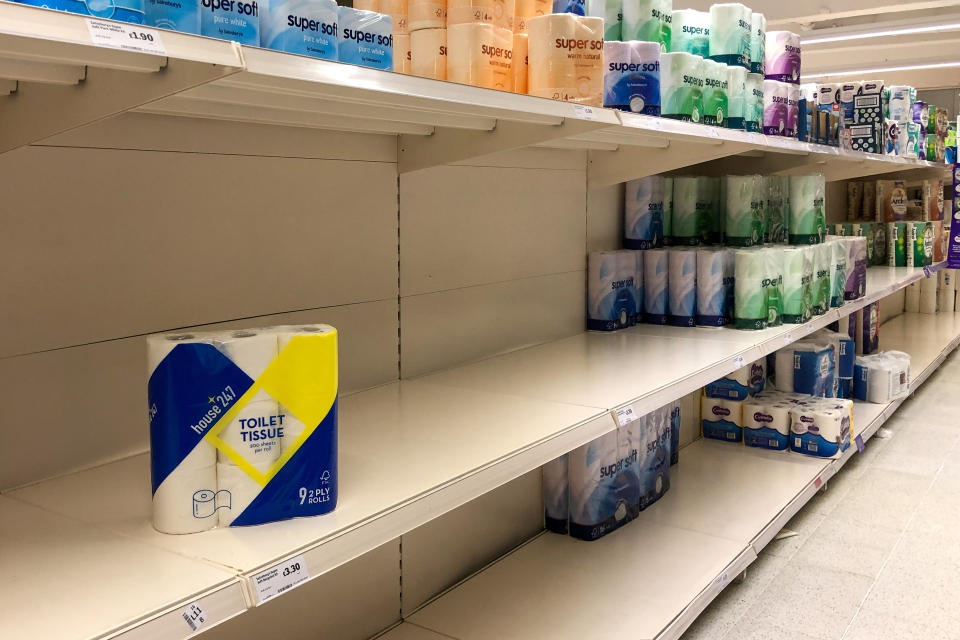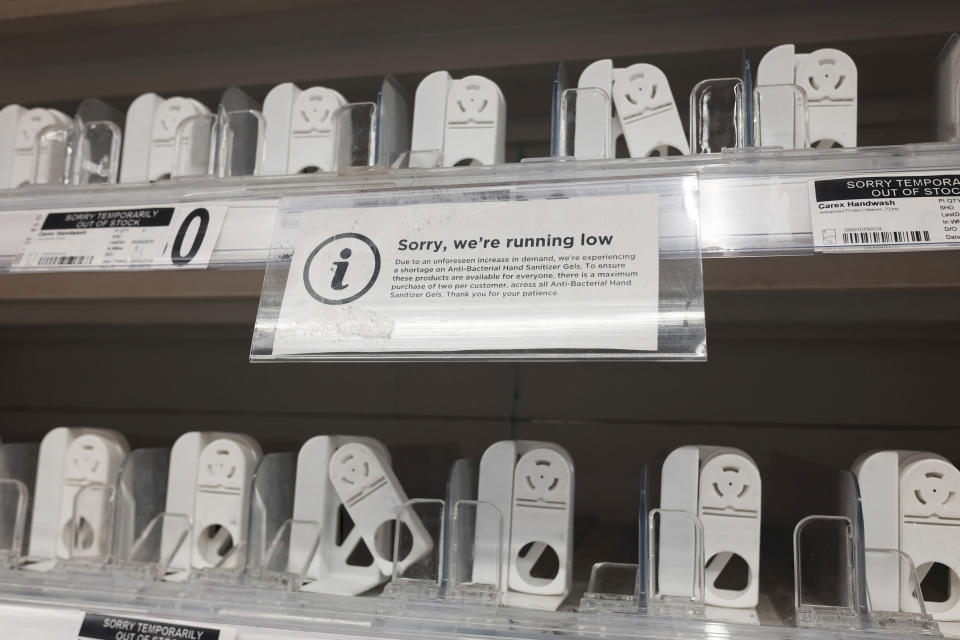The psychology and economic fallout of 'panic buying' over the coronavirus

Consumers are emptying supermarket shelves of non-perishable food items and toilet paper, in a seeming ‘panic’ over the spread of the coronavirus.
As of Saturday morning, 206 people in the UK had tested positive for coronavirus. That evening, a further three cases were confirmed in Northern Ireland — bringing the UK total to 209. Governments across the world as well as some companies are telling workers to work from home or by moving them to offices away from densely populated areas. Italy’s government just announced it is quarantining 16 million people in the northern part of the country — one of the worst affected places for the spread of coronavirus.
But this has led to climate in which people are panic buying goods across the UK and the government has told Brits to stop panic buying.
The government sought to reassure the public over supplies of everyday goods with health minister Matt Hancock saying on Thursday that the state had supplies of “key things.” He told a BBC Question Time audience there was “absolutely no need” for shoppers to buy more than usual.
Meanwhile, supermarkets across the UK will allegedly begin rationing food according to The Telegraph. Tesco will limit the amounts of basic food items customers are able to buy to ensure they don’t run out.
But is it ‘panic buying’ or is it a rational response? So-called ‘panic buying’ throws up big questions — such as how it escalates, whether retailers can cope, and what it tells us about human behaviour.
How much are consumers stockpiling?
Evidence is mounting that a growing number of consumers from Britain to Germany to Hong Kong are stocking up, amid fears over their health and over supply chain disruption.
Ocado has said UK shoppers are placing “particularly large orders” online. One unnamed UK supermarket leader told the BBC sales of pasta and tinned goods had gone “through the roof.” UK pharmacy chains report soaring demand for hand sanitiser, and toilet roll manufacturers have seen a “large spike” in demand.
Shoppers are sharing photos on social media in Britain and elsewhere of empty shelves in shops for in-demand goods, with #toiletpaperpanic trending on Twitter on Friday. Health and cleaning products, toilet roll and long-life food and drink appear in particularly high demand.
On Saturday, a UK retail executive told the Financial Times that for non-perishable goods, there is typically about three to four weeks of inventory in the supply chain and that “there will be gaps on shelves for a day or two while the system catches up.”
Read more: Coronavirus could leave one in five off work, government warns
Better evidence came in the form of a survey of 2,000 UK households last month. The Retail Economics research found almost one in 10 households reported they were stockpiling.
But concrete public data is so far hard to come by.
Many retail sales figures are published weeks or even months later. National-level sales figures also reveal only a limited amount about consumer behaviour, according to David Savage, a behavioural economics professor at Australia’s Newcastle University, told Yahoo Finance UK.
Is a ‘herd mentality’ driving consumers to over-buy?

Consumers rushing to stock up on products are often described as ‘panic buying,’ but Savage said the term itself is misleading.
‘Panic buying’ suggests consumers are “off the rails,” behaving in an illogical, random way, he says and such behaviour is a “very rational” reaction to the spread of the virus, Chinese supply chain issues, and other consumers’ reactions globally.
Consumers are reacting in a focused way by snapping up particular products they think they may need or struggle to get, particularly if they need to self-isolate, according to Savage. But he believes it also exposes three key human traits: herd behaviour, loss aversion, and regret.
It may start with an image of toilet paper shortages abroad circulating on social media, and the most risk-averse UK shoppers buying excessively “just in case.”
READ MORE: City bankers ready to flee to Basingstoke or Croydon
Then even the less risk-averse may pick up on their behaviour, and follow suit. “Once it starts, it snowballs and becomes self-fulfilling, like runs on banks,” he said.
“When you see someone else doing something, you think ‘maybe I should,’ even if you don’t understand it. It’s a herd mentality. All animals do it.”
But Savage said humans are also hard-wired to “hate losing” and regret, with studies suggesting losses are felt twice as keenly as gains. A key driver of stockpiling—and market sell-offs—could be the irresistible urge not only to avoid losing out, but also to avoid later regret.
How serious an issue is it for retailers and manufacturers?
Firms generally welcome higher demand for their goods, but a sharp, sudden rise can prove a significant headache.
Savage pointed out many UK retailers and manufacturers rely on just-in-time supply chains, meaning they hold very limited stocks in storage. Supply systems are built around typical monthly averages, “so retailers can’t restock or handle sharp shocks” easily.
There are questions too about whether supermarkets can handle rising online deliveries as more people stay at home, with Ocado warning on delivery times.
Bruno Monteyne, a retail analyst at Bernstein and former Tesco executive, has said supermarket contingency plans will include cutting back product ranges and focusing more on essentials. Jan Godsell, a Warwick University supply chain expert, said firms could also collaborate on online deliveries.
Companies are unlikely to raise prices, according to Monteyne, enduring lower profits rather than risk being seen as “profiteering at a moment of crisis.”
It could take a heavy toll on supermarkets’ bottom line, with Monteyne estimating a £1.2bn ($1.5bn) hit. Companies acknowledge supply chain problems linked to the virus, but few have issued serious warnings about stockpiling itself hitting supply or profits.
Helen Dickinson, chief executive of the British Retail Consortium (BRC), has said retailers are confident disruption will be limited. Ministers say the government has supplies of “key” products and there “won’t be a problem” with food supplies.
Most firms affected say they are ramping up supplies, with some moving to 24/7 production for goods like hand sanitiser. Waitrose chiefs are liaising with suppliers on an “hourly basis,” and say they are “agile” at handling such situations. One supermarket has reportedly even dusted off contingency measures drawn up for a no-deal Brexit to keep shelves stocked.
READ MORE: Hand sanitiser sales soar 255% as coronavirus fears grow
If things escalate, more radical measures are not unthinkable.
Some pharmacists are already limiting hand sanitiser sales per customer. A UK watchdog has warned firms it will take action over “rip-offs” as demand soars. Savage said authorities should regulate prices or effectively nationalise supplies of products like masks needed by health professionals.
Monteyne warned in a note to clients of riots if a “major” outbreak occurs, but said the army would step in to protect food supplies. The prime minister himself has said the military is “ready to back-fill” to assist the police if needed.
But Johnson said that was a “worst-case scenario.” The priority for now appears to be encouraging the public not to make shortages a self-fulfilling problem.
For full advice around the coronavirus from health professionals, check out the NHS website.

 Yahoo Finance
Yahoo Finance 